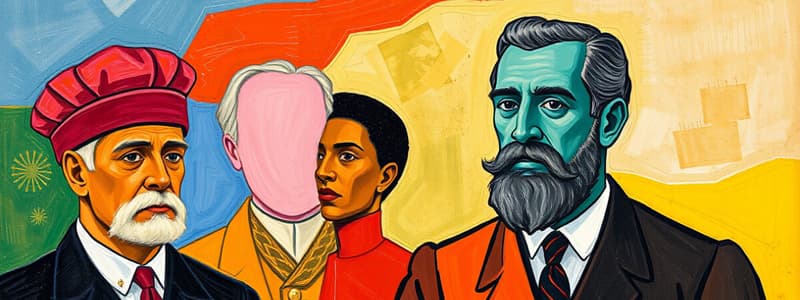Podcast
Questions and Answers
What is the main requirement of positivism in historical research?
What is the main requirement of positivism in historical research?
- Dependency on modern technology for research
- Use of empirical evidence and observable data (correct)
- Focus on oral traditions and folklore
- Emphasis on subjective interpretations of events
Which statement best describes the impact of American historians on the portrayal of Filipinos?
Which statement best describes the impact of American historians on the portrayal of Filipinos?
- They ignored Filipino history altogether.
- They portrayed Filipinos as civilized and self-sufficient.
- They highlighted Filipino advancements and culture.
- They depicted Filipinos as uncivilized to justify colonization. (correct)
What are the two objectives of postcolonial history?
What are the two objectives of postcolonial history?
- To highlight nation identities free from colonial discourse and criticize colonialism. (correct)
- To create a unified history of all nations involved in colonization.
- To emphasize the benefits of colonial rule.
- To glorify colonial powers and their methods.
Which mantra is associated with positivism in the field of history?
Which mantra is associated with positivism in the field of history?
What did Jose Rizal, Isabelo de los Reyes, and Pedro Paterno aim to convey in their historical narratives?
What did Jose Rizal, Isabelo de los Reyes, and Pedro Paterno aim to convey in their historical narratives?
How did North Korea and Nazi Germany influence historical narratives?
How did North Korea and Nazi Germany influence historical narratives?
What does collective identity rely on?
What does collective identity rely on?
What criticism does postcolonial history make about colonial narratives?
What criticism does postcolonial history make about colonial narratives?
Which approach did positivist historians advocate for historical arguments?
Which approach did positivist historians advocate for historical arguments?
What is a key feature of narratives written with a particular audience in mind?
What is a key feature of narratives written with a particular audience in mind?
Flashcards are hidden until you start studying
Study Notes
Collective Identity and History
- Collective identity is shaped by shared experiences, memories, and historical lessons.
- Understanding current circumstances, learning from past failures, and celebrating significant achievements help shape collective identity.
Positivism
- Positivism emerged in the 18th and 19th centuries as an approach prioritizing empirical evidence.
- The principle "No document, no history" reflects the demand for written primary sources in historical research.
- Positivist historians strive for objectivity and impartiality in their arguments and research practices.
Narratives as Propaganda
- Historical narratives are often tailored for specific audiences, influencing public perception.
- Jose Rizal, Isabelo de los Reyes, and Pedro Paterno crafted narratives portraying Filipinos as intellectually and culturally distinct for Spanish audiences.
- American historians framed Filipinos as uncivilized, providing a justification for colonization.
- Regimes like North Korea and Nazi Germany enforced their own official histories to control public understanding.
- Ferdinand Marcos attempted to influence historical narratives in the Philippines during the 1970s to align with state ideology.
Postcolonialism
- Postcolonialism arose in the early 20th century as formerly colonized nations reassessed their identities and societies.
- Two main goals of postcolonial history:
- To narrate national history that reflects identity without colonial bias.
- To critique the methods and ideologies of colonialism.
- Postcolonial history serves as a counter-narrative to prevailing colonial histories, challenging established viewpoints.
Studying That Suits You
Use AI to generate personalized quizzes and flashcards to suit your learning preferences.




